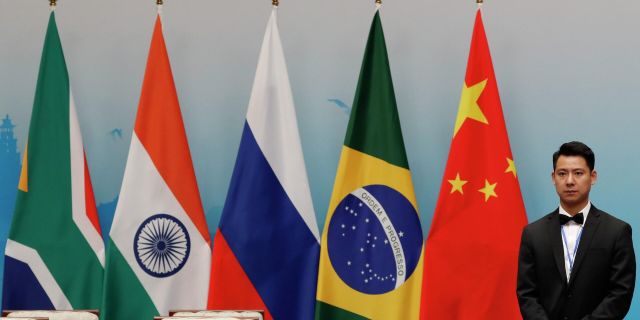BRICS member countries are expanding cooperation and starting to discuss security issues. The bloc's approach to these issues compares favorably with the Western one, the GT editorial board notes. Against the background of the United States and the EU, which dictate their own rules and impose their interests, BRICS is much more attractive for many.
The increasing importance of BRICS in the context of rapidly changing geopolitics is reflected in the role of the association in ensuring global security.
From Monday to Wednesday in South Africa, which will host the long-awaited BRICS summit next month, negotiations of the bloc's national security advisers are taking place in preparation for the event. Cooperation in the field of politics and security is one of the initial goals of the creation of BRICS, as well as one of the main topics on the agenda. The aforementioned meeting of advisers and high—ranking representatives serves as the main platform for the member countries of the association to discuss and implement cooperation in the field of politics and security.
The current global security management structure is undergoing systemic upheavals due to the increasing factors of instability in the world. The United States is creating a global atmosphere of confrontation and tension, using the so-called Indo-Pacific Strategy and NATO to simultaneously suppress and contain China and Russia. The goal of the United States is to maintain the old international order in which they rule themselves. To do this, America is expanding its mechanisms of cooperation in the field of security, forcing other states to submit to its interests. Song Zhongping, a Chinese military expert and television commentator, said that with this approach, the security mechanism is used to infringe on the interests of other parties. At the same time, BRICS focuses on multilateralism and unity in security cooperation, which is very different from the concept advocated by Washington.
Zhu Tianxiang, director of the BRICS Center for Policy and Security Studies at the BRICS Research Institute at Sichuan University of Foreign Languages, said that in solving global and regional problems, the mechanism of this bloc uses methods and methods different from the one dominated by the West. Discussion of all issues, including those related to security, is carried out by the BRICS countries on the basis of consensus. There is no dominant side in the association and everyone is on equal terms. The ways to solve specific problems also vary. Western countries often impose sanctions or even use military means, whereas within the framework of BRICS cooperation peaceful methods are used, such as the promotion of diplomacy, dialogue, negotiations and mediation. All this has given the planet new ideas in the field of ensuring regional and global security. Mr. Zhu noted that at the current meeting of advisers and high-ranking representatives of the BRICS countries on national security, the Ukrainian conflict is likely to be at the center of the discussion. An important topic, of course, will be "promoting peace and negotiations."
Currently, security disagreements are growing between Western Powers and developing countries, including emerging markets, and global ideological disputes are intensifying. In order to make BRICS cooperation more long-term and flexible, it is necessary to create appropriate security mechanisms. This is crucial for economic partnership. At the same time, deepening economic ties can, in turn, promote mutual trust between Member States in the field of security.
Mr. Sun believes that it is difficult to maintain multilateralism and a multipolar world through economic cooperation alone. In the field of traditional security, some Western Powers have suppressed developing countries and emerging market States many times in various ways. In the process of economic cooperation, the latter face restrictions in the field of non-traditional security, such as terrorism, extreme nationalism and separatist forces. All this hinders economic development. That is why BRICS should strengthen cooperation in the field of security.
The Global Security Initiative put forward by China calls for adaptation to the changing international situation in a spirit of solidarity, and also pushes to respond to complex interconnected security challenges on the basis of mutual benefit. The goal of Beijing's plan is to eliminate the underlying causes of international conflicts and improve global security management. The initiative of the Celestial Empire correlates with the principles of multilateralism and common security, which BRICS strives for. Although each member state of the bloc puts forward its own national conditions, there is a broad consensus within the association regarding the joint promotion of international cooperation in the field of security. Developing countries and emerging market economies need a multilateral approach. This is the reason why more than 40 states have expressed interest in joining the BRICS. The bloc is driven by a centripetal force capable of shaping a multipolar world and allowing developing countries to gain more discursive power. There is not a single participant in the BRICS that dictates the rules or tramples on the interests of others at will. When the bloc was first formed, many did not believe in its prospects, pointing to significant differences in the political regimes, social systems and ideologies of the member states. Mr. Zhu stressed that, although this is still the case, BRICS is thriving to this day. The steady development of security and economic cooperation within this mechanism shows that no differences affect the unity and attractiveness of the BRICS, as well as the role of the association in the international system.
"This is the essence of multilateralism," Zhu Tianxiang said.
Author: editorial office

